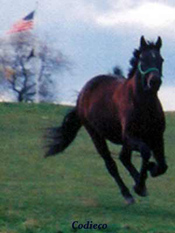
Shop for CD's at CDRush.com & the EPN Benefits!
Put "EPN" in the Coupon Code box when you place your order.
Now you can save money on your favorite music and help the horses at the same time!
EPN Website Sections
Press Stories 1980-2004
Caution Horses For Slaughter
by Heather Chapin-Fowler of the Corral Staff
The Final Roundup Pittsburgh Magazine 5 /2004
Fighting to Stop the Sale & Slaughter of US Horses in Foreign Countries - KDKA TV Investigates 4/30/2004
The Slaughter Question Horse & Rider 12/2002
State Ranks High in Equine Slaughter WTAE's Paul Van Osdol Reports 4/27/2001
Slaughterhouse Ride WISH TV News 8 I-Team Investigative Report 4/2001
Illinois Defeats Horse Slaughterhouse! 1999
Kill Sale Pittsburgh Post Gazette 6/ 1999
Horses To Slaughter
Police, vet check horses' health at New Holland sale
July 1998
PA Horse Transport Legislation - Act 64 of 2001
Horse Transport Bill Passes Unanimously WTAE's Paul Van Osdol Reports 6/21/2001
State Lawmakers Urged to Protect Horses en route to Slaughterhouses
June 1998
State Concerned with Cruelty to Horses Taken for Slaughter
'TRAIL OF TORTURE' ?
June 1998
Horse-Slaughter Industry Critics Pushing Changes
PA. Bill Would Help Protect Horses Headed to Slaughter
March 28, 1998
The goal is a humane trip for horses on the way to be killed for their meat, prized in Europe.
New York Does PA's Dirty Work January 1998
NYSP Stop Double Deck Trailer
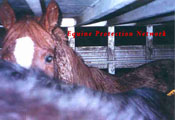
Horses inside double deck cattle trailer stopped by the NYSP. The owner was later convicted & fined $3000.00.
Horse Popsicle Case 1994
Cruel Transport Results in $11,100 Fine
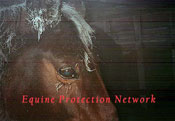
Horses inside double decker covered with frost.
The Last Ride
Eyewitness Account of trip to Slaughterhouse
Overcrowding, negligence plague Shelby horse feedlot
Great Falls Tribune 8/10/2003
The Torture Trail
December 1980
85 horses in trailer, 57 survive
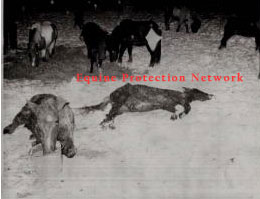
A dead horse lies in the snow, while another too weak to rise eats from a bucket.
The Miracle Mile July 1990
Pregnant Mare Foals Hours After Rescue From Slaughterhouse-
Foal is a Stakes Winner!
 Pasturemate of the Stakes Winner, "On Route 66" who was born only hours after her dam was taken from a slaughterhouse
Pasturemate of the Stakes Winner, "On Route 66" who was born only hours after her dam was taken from a slaughterhouse
PA Dealer Sent to Prison 1999
Shady Horse Dealing
Renaissance Bob 12/ 1998
Rescue of a Racehorse
An Eye For An Eye
Story of Catch-22

Links
California Voters "Just Say Neigh" to Horse Slaughter!
HoofPAC
Shop online at IGive.com with over 600 great stores you know & love- including Back In the Saddle! Up to 26% of the purchase price is donated to the EPN!
The EPN gets $5 extra the first time you shop!
PayPal accepts credit cards! Please send your tax deductible donation to the:Equine Protection Network, Inc.,
P. O. Box 232, Friedensburg, PA, 17933.
HoofPAC is the political action committee that has been formed to end the slaughter of America's horses. Cathleen Doyle, founder of HoofPAC, led the successful Save The Horses campaign in 1998 that made the slaughter of California's horses a felony.

A 'TRAIL OF TORTURE' ?
Horse-Slaughter Industry Critics Pushing Changes
Williamsport Sun Gazette
By Abbey J. Porter, Sun- Gazette Staff
PA Horse Transport Law Cards
Download a card and carry in your car. Help enforce PA law banning the use of double deck trailers to transport any horse, no matter what its final destination!
Critics of Horse-Slaughter Industry Allege 'Trail of Torture'
 From the childhood fascination of Black Beauty to the romantic appeal of "The Horse Whisperer, horses are widely regarded as symbols of beauty and devotion.
From the childhood fascination of Black Beauty to the romantic appeal of "The Horse Whisperer, horses are widely regarded as symbols of beauty and devotion.
But some say horses' trust in humans is being betrayed in the worst possible way, and horse lovers may know little about an industry claiming their companions.
As Pilgrim, equine star of "The Horse Whisperer." makes his silver-screen journey cross-country, many less fortunate horses pass by Williamsport on a very different kind of trip: their last. Purchased at Pennsylvania auctions by "killer buyers," they are shipped to Canadian slaughterhouses, and their meat is sold overseas for human consumption.
Some are old and used up, others simply unwanted. Many are racehorses that weren't quite fast enough or were sidelined by injuries. Critics of the industry contend the trip to slaughter is a trail of unnecessary torture: Stallions and foals, ponies and draft horses are herded onto trailers together to travel hundreds of miles without food, water or rest.
Injuries can result from fights and the struggle to keep footing on slick floors. Horses that fall may not rise, and some die long before reaching the killing floor.
Especially controversial is the use of double-decker trailers designed for cattle and hogs. Detractors say their low ceilings make it even more difficult for horses to keep their balance
"The transportation of slaughterbound horses and the treatment of horses at auction are a black eye to the horse industry."
said Christine Berry of the Equine Placement Network, Friedensburg. Her organization has spearheaded legislation to reduce the suffering of horses on their last ride.
According to the U.S. Department of Agriculture, more than 88,000 horses were slaughtered in the United States during the 1996-97 fiscal year, and an undisclosed number were shipped to slaughter in Canada. But Berry said the industry and its methods of operation are virtual secrets, even among horse people.
"So many people just do not know," she said. "Some people don't want to ..... . It's too horrible for them to think."
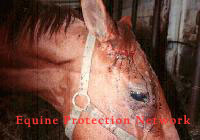 Young Mare purchased by a meat dealer and placed in a " kill pen" awaits shipment at the New Holland auction in Lancaster County. According to a witness, she suffered the head wound in a fight with another horse. Auction critics say fights are common in the kill pens, as horses of all sizes and dispositions are turned loose together. The mare was lucky: a bystander purchase her from the dealer.
Young Mare purchased by a meat dealer and placed in a " kill pen" awaits shipment at the New Holland auction in Lancaster County. According to a witness, she suffered the head wound in a fight with another horse. Auction critics say fights are common in the kill pens, as horses of all sizes and dispositions are turned loose together. The mare was lucky: a bystander purchase her from the dealer.
Proposed Changes
House Bill 2127, introduced by state Rep. Jim Lynch of Warren County, would outlaw use of double-decker trailers for equine transportation and would require all trailers to be at least 78 inches tall, have non-metallic, anti-skid flooring, smooth interiors, adequate ventilation and insulation, and doorways, ramps and partitions that meet equine industry standards.
It would prohibit transportation of foals, pregnant mares and blind, sick and injured horses and would require separation of animals by size.
All horses would need an equine veterinarian's "fit to travel" certificate, and haulers would be required to seek medical attention for any animal injured in transit.
Berry emphasized that the legislation is aimed not at stopping horse slaughter, but at ensuring the animals don't suffer needlessly.
"We are not 'animal-rights' people,"
Berry said.
She noted the legislation would not hinder the slaughter of healthy horses and likely would have minimal economic impact on the industry Anne McCloskey, director of The Harness Horse Retirement and Youth Association Inc. in Loganton, agrees that change is desperately needed. A veteran horsewoman, she works to educate the public in responsible horse ownership.
She said that, for some horses, slaughter is appropriate. The question she asks is, "Why can't we do it humanely?"
Berry contends that existing cruelty laws aren't being enforced:
"Because they're going to slaughter, the attitude's been taken, 'Who gives a damn?"'
Equine Placement Network has the support of more than 25 state and national organizations, including the U.S. Trotting Association, National Association of Thoroughbred Owners, Pennsylvania Thoroughbred Horsemen's Association and McCloskey's organization. A public hearing on the legislation was held Thursday in Gettysburg. Those wishing to express opinions may direct letters to the judiciary committee, c/o Rep. Thomas P. Gannon, House Box 202020, State Capitol, 17120-2020.
The 'Torture Trail'
The fight to regulate equine transport has been waged elsewhere - similar laws are in place in several states, including New York, Massachusetts, Connecticut and Vermont.
New York's law was passed 17 years ago following public outcry over published reports of horse-transport horrors - including one dubbed the "Torture Trail Incident."
In December 1980, a double-decker trailer loaded with 80-plus horses was stopped by state police in Schroon, N.Y
Veterinarian Dr. Robert Lopez was summoned and arrived to find "a sickening, smelly mess." Several animals were dead. One pony had been trampled to death, and another's eye had been gouged out. Many had compound fractures, and some lay flat on the floor with other horses standing on them.
It was enough to make state troopers sick to their stomachs, Lopez recalled.
He said the animals hadn't been fed or watered in days. Some fell flat and tried to eat snow when unloaded. Only about half of them survived. New York's transportation law was passed - unanimously - a short time later, but Lopez said such conditions continue among horses shipped from Pennsylvania and points south to Canadian slaughterhouses. Though he said they travel at night in an attempt to avoid detection, some haulers are arrested after crossing the New York border. As far as Lopez is concerned, the "Trail of Torture" never stopped. The problem:
"Nobody seems to care."
A Long Journey
The trip to slaughter often is a long one. With only five equine slaughterhouses in the country, most Pennsylvania horses are shipped to Canada, Ohio or Texas.
Berry says that journey can be grueling - especially for horses already in poor condition.
She is more familiar than most with horse trailers. For 2 1/2 years, she rode in them to monitor race, show and breeding horses being shipped long distances. Even in partitioned trailers with rubber mats, hay, water and regular rest periods, she has seen healthy horses' heads hanging from fatigue by the end of a long journey.
"The killer buyers can say whatever they want to say but I've ridden back there with them," she said.
New Holland
According to Berry, change must start at the auctions at which slaughter horses are sold.
One of the largest is New Holland Sales Stables in Lancaster County. According to auction owner Norman Kolb, an average of 250 horses from all over the state are sold every Monday. Meat horses sell for $100 to $900, depending on their size and condition.
He said of the proposed legislation,
Kolb, who describes himself as a horse lover, said the animals at his auction are treated humanely."I really don't think it's necessary.
he said."The people who are pushing this (legislation) are animal-rights people who do not want these horses slaughtered, period,"
Kolb said horses that are sick or have broken bones or open sores are not allowed into the auction.
A staff veterinarian present "most of the time" determines whether horses are fit for sale, he added. He admitted, however, that it's difficult to turn away owners or tell them their animals should be put down. But Kolb maintained that dealing with such situations is "really not a problem" at New Holland and that, while "isolated incidents" may occur,
"they're not happening with any frequency.""We try to take the best care we can. . . We try to do a good job," he said.
Others tell a different story - like Dr. Margaret Mullin, an independent Lancaster County equine veterinarian summoned to the auction twice in recent months by concerned bystanders. In April, she found a horse and a mule, both with broken legs, on a trailer.
She euthanized both animals.
Though they bore hip tags from the auction, she said, no one was eager to claim ownership.
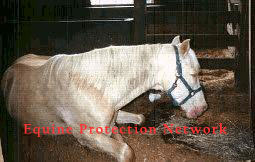 On Memorial Day, she was called to examine a palomino gelding spotted lying in the "kill pen" area where horses purchased for slaughter await loading. By the time she arrived, the horse had been moved to a trailer.
On Memorial Day, she was called to examine a palomino gelding spotted lying in the "kill pen" area where horses purchased for slaughter await loading. By the time she arrived, the horse had been moved to a trailer.
Mullin diagnosed him as foundered, a condition that affects horses' feet and makes standing painful. She said she recommended against shipping the horse because she believed doing so would be inhumane.
she explained."Founder is a very painful condition. . . one of the most painful things a horse has to go through,"
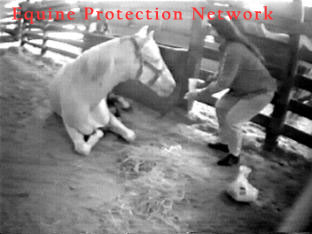 But she said the animal's owner, who said he was taking the horse home for treatment, was allowed to transport the horse from the auction. According to Berry, however, the horse had been purchased by a known killer buyer and likely was headed to a slaughter house.
But she said the animal's owner, who said he was taking the horse home for treatment, was allowed to transport the horse from the auction. According to Berry, however, the horse had been purchased by a known killer buyer and likely was headed to a slaughter house.
To Mullin, transporting such animals is unquestionably inhumane. She said laws are needed to ensure each horse entering an auction is checked by a vet. Conditions like founder and broken legs are obvious and could be spotted with even a cursory examination, she added.
"These never would have passed a vet check," she said.
Berry also has documented horses with gashes, swollen limbs and sores in the auction's kill pens and says the animals often are kept in filth and deprived of food and water. She said she has seen lactating mares with foals whipped into the auction ring, and frightened horses forced onto trailers with electric cattle prods.
Who is Responsible?
Though he deems it unnecessary, Kolb said he agrees with the legislation in principle.
"I really see nothing drastically wrong with it," he said. "I agree with everything they're saying."That includes banning double-decker trailers, which he agreed are inappropriate for horse transport. But he claimed that 90 percent of truckers have stopped using them anyway, and those who do don't go to New Holland.
Nevertheless, Kolb said he doesn't support the bill because it couldn't be enforced.
Responsibility lies with those who transport horses, he said, adding,
But veteran hauler Arlo Kiehl, who lived in Montoursville in the 1960s, said it's an auction's responsibility not to sell unfit horses in the first place."I don't think they can legislate to make truckers haul a horse humanely."
A resident of Watertown, N.Y., he has been buying and transporting horses for 40 years. About 60 percent of the 3,000 animals he hauls yearly go to a Canadian slaughterhouse that ships its meat to Belgium. Kiehl uses a double-decker trailer and said he will continue to do so, despite the fact that he has been arrested several times recently in New York, hauling horses from the New Holland and Middleburg auctions.
"This is not inhumane,"
insisted Kiehl, who also described him-self as a horse lover. He said his animals have adequate space, and he stops regularly to check on them.
The most important thing, Kiehl emphasized, is for truckers hauling horses to be qualified.
"I know how to load horses for comfort,"
he said Kiehl pointed out that, as a self-employed hauler, it's against his interest to put his purchases at risk.
he explained. But he said not all truckers are as careful - especially those who "haul for hire" and don't pay for the horses with their own money."When I buy these horses, it's my money that's tied up,"
he said."Some are a little bit ruthless,"
Kiehl agreed that "horses with broken legs shouldn't be shipped." He said he
"absolutely" can tell whether a horse's leg is broken and added, "I wouldn't load such a horse."
He admitted the mule put down in April by Mullin had been on his trailer but explained that it belonged to someone else. A spokesperson at the Lancaster County Humane League confirmed that charges are being filed against another man who owns the mule. But Kiehl denied that any other animals on his trailer had been put down.
A Sad Contradiction
Berry, Kolb and Kiehl seem to agree on one point:
Responsibility for the condition of horses sent to auction ultimately lies with the animals' owners.
she said."Most of these horses have never been treated this way in their lives,"
She sees the horses as victims of human greed. Rather than paying for a veterinarian to euthanize an ailing animal, some owners want to get the last few dollars they can out of them. But as far as Berry is concerned, an owner who can't afford euthanasia can't afford a horse.
"It's not OK to make a horse suffer for days . . . so you can get $500 in your pocket," she said. "'that's cruel. It's wrong.
Points To Ponder
Equine Protection Network
According to Kolb,
Polls by Decision Research in New York and CA proved that overwhelmingly Americans do not want horses slaughtered for human consumption overseas."The people who are pushing this (legislation) are animal-rights people who do not want these horses slaughtered, period,"
CA voters passed Prop 6, banning the sale of CA horses to slaughter.
Does this mean that close to 90% of Americans are "animal rights activists"?
Does this mean that the will of the people should be ignored?
Does this mean that all of the professionals, in the horse industry, who are opposed to horse slaughter, are no longer horse professionals, but instead "animal rights activists"?
Though he deems it unnecessary, Kolb said he agrees with the legislation in principle.
"I really see nothing drastically wrong with it," he said. "I agree with everything they're saying."
That includes banning double-decker trailers, which he agreed are inappropriate for horse transport. But he claimed that 90 percent of truckers have stopped using them anyway, and those who do don't go to New Holland.
If Mr. Kolb agrees with everything we are saying, and he refers to the EPN as "animal rights activists", does that make Mr. Kolb an "animal rights activist" too??If as Mr. Kolb states the truckers who use double deckers are no longer coming to his New Holland auction to haul horses, then how have the New York and PA State Police been able to arrest and later convict Arlow Kiehl for using a double deck cattle trailer to transport horses from New Holland?
Mr. Kiehl or his drivers have been arrested by the New York or PA State Police in: August 1998; December 1998; August 1999 and most recently in June 2000.
Everytime he had horses on. Everytime the load originated from the auction in New Holland, PA.
Who or what should we believe, court records, log books, photographs, police officers' eyewitness accounts or Mr. Kolb?
According to Arlow Kiehl,
If this is not inhumane, then why have several states outlawed the use of double deckers for horses?"This is not inhumane,"
Why has the USDA in their own research come to the conclusion that doubles are inhumane for horses?
If doubles are humane, and such a wonderul way to transport horses, then why don't we see them advertised in horse magazines?
Then why are horses injured and killed in these trailers?
Why do haulers need to use whips and electric cattle prods to load the horses?
The fact that double deck cattle trailers are inhumane for horses is a no brainer to anyone who has ever been around a horse & to most people who have not.
According to Mr. Kiehl,
"absolutely" can tell whether a horse's leg is broken and added, "I wouldn't load such a horse."
If that is true, then why did Mr. Kiehl state to Dr. Mullin in front of several witnesses that he believed the mule to have a "bowed tendon"??
Save America's Horses!
|
|||||||

